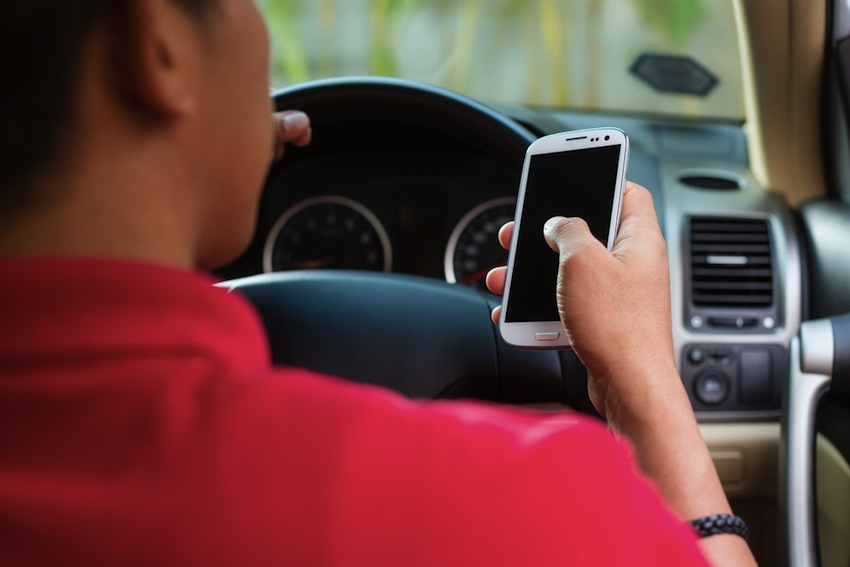Harvard Scholar Working With Hollywood to Curb Distracted Driving

texting while driving photo via shutterstock.com
Wagging a finger at drivers and telling them that texting while behind the wheel could lead to them killing someone in a collision isn’t enough to get the message across to motorists to stop doing it. So Harvard’s associate dean for health communication is lobbying star-studded actors and well-known television writers to try and implant a warning about the risks of distracted driving into the minds of the American public through their shows.
Jay Winsten, the Frank Stanton Director of the School of Public Health’s Center for Health Communication at Harvard, says with enough pull, and the help of the creative forces behind some of the top sitcoms and television series coming out of Los Angeles, he can reduce the number of accidents caused by drivers texting, and change the overall perception of the action. “You need a simple message and the ability to send that message over and over again,” says Winsten.
Through the power of storytelling, he says, Hollywood can demonstrate the impact of distracted driving through fictional narrative programming. By implanting scenes and story lines into popular shows, the general public will better absorb the message and in turn, says Winsten, it will shape driving behaviors. “A storyline can play out, and it’s not simply just a reference of distracted driving, it can part of the storyline for certain characters and gives the writers a new plot line,” he says.
Winsten says simply banning distracted driving on its own, and relying on campaign messages and police enforcing the law by ticketing drivers and issuing citations isn’t going to plant the seed that people need in order to transform the social norms.
According to a recent survey conducted by the AAA Foundation for Traffic Safety, distracted driving, which includes texting, programming a GPS device, or generally looking away from the road, contributed to 16% of all fatal crashes, leading to around 5,000 deaths every year nationwide. In the survey, a third of drivers admitted that they looked away for one second or less, however, 12% of drivers looked away from the roadway for at least four seconds, the report said, something Winsten called the equivalent of “having their eyes closed for the length of a football field” behind the wheel.
Although Massachusetts, and many other states, have shifted laws into high gear to put an end to distracted driving, and more specifically texting while operating a motor vehicle, Winsten says more needs to be added on to the rule in order to truly make a change in how people act in an age where social media and mobile devices are used with consistency. “People are engaged in the storylines of shows, so [the message] is integrated in a deeper way,” he says.
Winsten got the idea to work with colleagues on this particular project based on past success he had with a similar initiative. In the late 1980’s, the Harvard professor was the driving force behind an aggressive national campaign that got the message out about “designated drivers” by inserting references to the term into more than 160 television episodes that held prime time slots over the course of four seasons, including “Cheers” and “The Cosby Show.” “Four years into the project, the term ‘designated driver’ was literally in the dictionary, and the public opinion polls had reported they were changing behavior and people were choosing a designated driver,” says Winsten, adding that the campaign, with the help of advertising and groups like Mothers Against Drunk Driving, helped drunk driving-related deaths dip by more than 25-percent.
When they launched the idea, Winsten and his colleagues met with more than 150 producers and writers in Hollywood, and asked them to occasionally slip in a line or two of dialogue about the new social norm of using “designated driver” when out drinking so the notion would sink into the brains of viewers. “Nothing can begin to rival and make an impact than when people identify with characters and that enormous potential for shaping social norms,” he says, which was done by putting the words in the mouths of peoples’ favorite TV celebrities.
To move his current goal forward, and try to make a national impact again, Winsten will be convening with “some of their friends in Hollywood” soon, and create an advisory board to reach out to today’s writers and producers and address this issue through there creative work, hopefully mirroring the designated driver campaign. “It’s all about taking care of each other rather than just saying don’t text and drive. We didn’t say don’t drink back then, we said if you [go out] take your turn to occasionally be a designated driver, instead. Hollywood got a punch line out of it, and it was a better effect than lecturing and wagging fingers,” he says.


